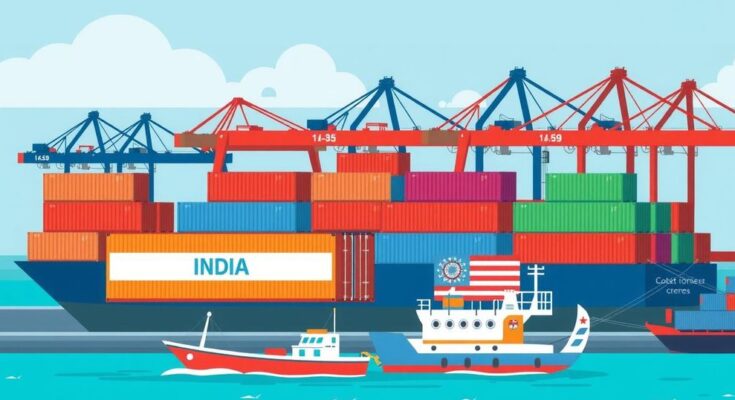The Federation of Indian Export Organisations calls for tariff exemptions for India to promote bilateral trade with the U.S., emphasizing the need for smoother trade relations to meet ambitious targets. Discussions for a bilateral trade agreement are underway, though challenges exist due to past tariffs and U.S. political stance. India’s trade statistics reveal significant exports and imports, reflecting the complexity of trade negotiations ahead.
The Federation of Indian Export Organisations (FIEO) advocates for a tariff exemption for India, citing its constructive engagement with the United States and the potential for a Bilateral Trade Agreement. FIEO Director General Ajay Sahai noted that the ambitious Mission 500 aims to elevate bilateral trade from approximately USD 200 billion to USD 500 billion, with the tariff exemption facilitating this goal.
An exporter indicated that removing tariffs would alleviate uncertainties and stimulate exports to the U.S. Nonetheless, the Global Trade Research Initiative (GTRI) posits that an exemption from Trump-era tariffs is improbable, particularly as India is portrayed as a “high-tariff” nation by the former president. GTRI Founder Ajay Srivastava emphasized that any exemption would require significant concessions from India in various sectors beyond trade.
Moreover, he suggested that India should maintain its stance on essential strategic and national issues, asserting that if tariffs are imposed, India should remain steadfast, as global scrutiny is on its actions. He commented on the instability of Trump’s tariffs, asserting that they are driven by whims rather than principles and are unsustainable in the long run.
Discussions on the proposed bilateral trade agreement commenced recently, led by Assistant U.S. Trade Representative Brendan Lynch, who is engaging with Indian officials. Both nations aim to finalize the initial phase of the agreement by fall 2025, addressing mutual concerns over market access and tariff adjustments in sectors such as textiles and industrial goods.
In terms of trade statistics, India’s exports to the U.S. in 2024 included drug formulations, telecom instruments, and precious stones, while imports comprised crude oil, diamonds, and electric machinery. The impending changes in tariffs and trade agreements will play a crucial role in shaping the future of Indo-U.S. trade relations.
In conclusion, the potential for tariff exemptions could significantly impact India-U.S. bilateral trade. While FIEO and other exporters advocate for such exemptions to facilitate trade, challenges exist due to the current political climate and historical tariffs imposed by the U.S. India’s strategic negotiations and the continual monitoring of trade dynamics will be essential in achieving the ambitious goals laid out in the Mission 500 initiative.
Original Source: m.economictimes.com




